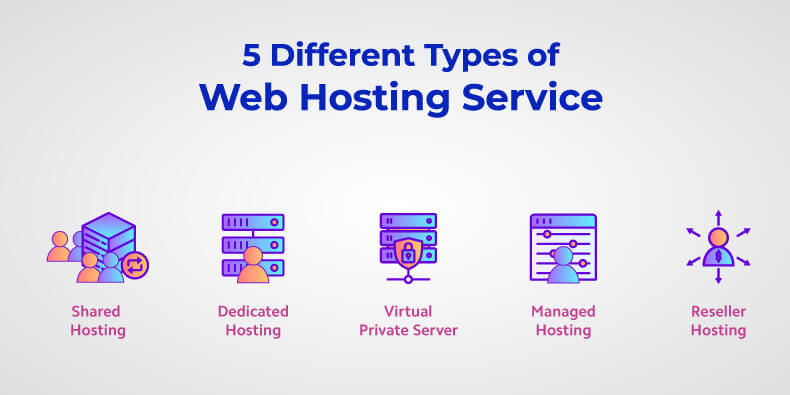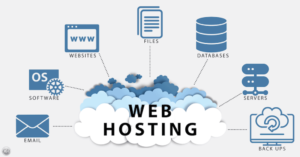Introduction
- Understanding the different types of website hosting is crucial for anyone looking to establish an online presence.
- With various hosting options available, it’s essential to choose the right one that suits your specific needs.
- In this article, we will explore the five different types of website hosting: shared hosting, virtual private server (VPS) hosting, dedicated server hosting, cloud hosting, and managed WordPress hosting.
- By the end of this article, you’ll have a clear understanding of each hosting type and be able to make an informed decision for your website.
Shared Hosting
Shared hosting is the most common and affordable hosting option available.
- Definition and features: In shared hosting, multiple websites are hosted on a single server, sharing its resources like disk space, bandwidth, and server capabilities.
- Pros:
- Cost-effective solution for small websites or beginners.
- Easy to set up and manage, as the hosting provider takes care of server maintenance and updates.
- Cons:
- Limited resources can lead to slower loading times if other websites on the server experience high traffic.
- Limited control and customization options compared to other hosting types.
Virtual Private Server (VPS) Hosting
VPS hosting offers more control and resources than shared hosting.
- Definition and features: VPS hosting utilizes virtualization technology to divide a physical server into multiple virtual servers, providing each website with dedicated resources and greater control over server configurations.
- Pros:
- Enhanced performance and stability due to dedicated resources.
- Scalability options allow for easy resource allocation based on website needs.
- Cons:
- Higher cost compared to shared hosting.
- Requires more technical knowledge for server management and configuration.
Dedicated Server Hosting
Dedicated server hosting provides the highest level of control and performance for websites with high traffic or specific requirements.
- Definition and features: With dedicated server hosting, you have an entire physical server dedicated to your website. This means you have full control over server resources and configurations.
- Pros:
- Maximum performance and reliability, as resources are not shared with other websites.
- Flexibility to customize server settings and software based on your needs.
- Cons:
- Expensive compared to other hosting options.
- Requires advanced technical skills to manage and maintain the server.
Cloud Hosting
Cloud hosting is a scalable and flexible hosting solution that utilizes multiple servers to ensure reliability and high performance.
- Definition and features: Instead of relying on a single physical server, cloud hosting distributes website data across multiple interconnected servers. This allows for seamless resource scalability and high uptime.
- Pros:
- Scalable resources that can handle traffic spikes and accommodate growth.
- Enhanced reliability and uptime due to the distributed nature of the infrastructure.
- Cons:
- Costs can vary based on resource usage, potentially becoming expensive for high-traffic websites.
- Requires understanding of cloud technologies and configurations.
Managed WordPress Hosting
Managed WordPress hosting is specifically designed for WordPress websites, offering optimized performance and easy management.
- Definition and features: Managed WordPress hosting providers specialize in hosting WordPress sites, providing automatic updates, enhanced security measures, and specialized support.
- Pros:
- Improved website performance and loading speeds through server optimization.
- Automated backups and updates, reducing the need for manual maintenance.
- Cons:
- Limited to WordPress websites only.
- Reliance on the hosting provider for certain updates and configurations.
Conclusion
- Choosing the right website hosting type is crucial for the success of your online presence.
- Shared hosting is an affordable starting point, but it may lack the necessary resources for high-traffic sites.
- VPS hosting offers more control and scalability, while dedicated server hosting provides maximum performance and customization options.
- Cloud hosting ensures flexibility and high uptime, while managed WordPress hosting optimizes performance for WordPress websites.
- Consider your website’s requirements and growth plans when selecting the most suitable hosting option.
FAQs
- What is the best hosting type for a small business website?
- Shared hosting can be a cost-effective choice for small business websites with low traffic. However, if you anticipate growth or require more control, consider VPS hosting.
- Can I switch from shared hosting to VPS hosting later?
- Yes, most hosting providers offer migration services to switch from shared hosting to VPS hosting when your website outgrows its current plan.
- Is dedicated server hosting suitable for e-commerce websites?
- Yes, dedicated server hosting provides the necessary resources and security for high-traffic e-commerce websites that handle sensitive customer data.
- How does cloud hosting differ from traditional hosting?
- Cloud hosting utilizes multiple servers instead of a single physical server, offering better scalability, reliability, and flexibility compared to traditional hosting options.
- Do I need technical knowledge to manage a VPS or dedicated server?
- Yes, managing a VPS or dedicated server requires technical skills. However, many hosting providers offer managed services where they handle server management on your behalf.




